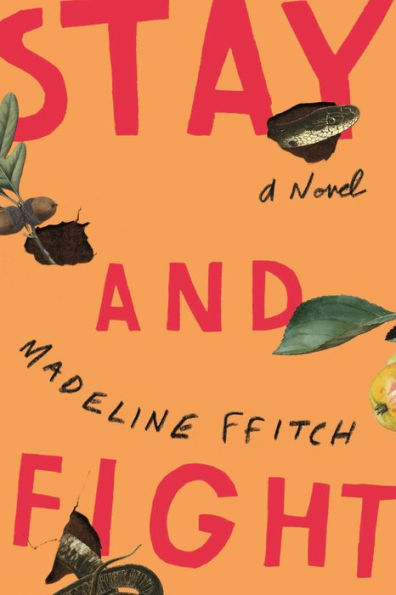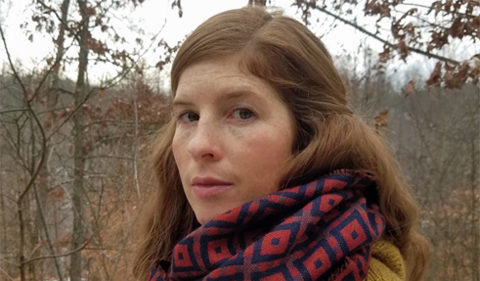What are kids in fiction for? They’ve typically been symbols of our collective innocence, like Scout in To Kill a Mockingbird. Or proof of humanity’s inherent brutality, as in Lord of the Flies. Or heroic exemplars of resilience in the face of adversity — a specialty of YA, from The Boy Who Lived on down. It would go too far to say that Perley, the young boy who plays a central role in Madeline Ffitch’s excellent debut novel, Stay and Fight, represents a new symbolic figure in literature — like many before him, he’s a literal babe in the woods. But babes in the woods are supposed to make their way to “normal” society. Perley doesn’t; doesn’t want to, doesn’t need to. He is the child as American survivalist, the kid who represents how we’ll need to get by in a country where institutional support beams are increasingly knocked down.
 In Ffitch’s novel, the biggest (but hardly only) beam getting felled is the environment, represented by the fracked natural gas pipeline that snakes through the parcel of Appalachian Ohio where Perley grows up. Helen, one of the novel’s four narrators, arrived in the region with her boyfriend from the Northwest bearing a college education, an inheritance that helped her buy some woodland property, and zero experience about what it takes to be a back-to-the-lander. Once the boyfriend leaves, she despairs of a decent living, until an exasperated local explains that she already has one: “You’ve got twenty acres and ducks. No one to tell you what you can and can’t do. No one to bother you. Goddamn. There’s no pleasing some people.”
In Ffitch’s novel, the biggest (but hardly only) beam getting felled is the environment, represented by the fracked natural gas pipeline that snakes through the parcel of Appalachian Ohio where Perley grows up. Helen, one of the novel’s four narrators, arrived in the region with her boyfriend from the Northwest bearing a college education, an inheritance that helped her buy some woodland property, and zero experience about what it takes to be a back-to-the-lander. Once the boyfriend leaves, she despairs of a decent living, until an exasperated local explains that she already has one: “You’ve got twenty acres and ducks. No one to tell you what you can and can’t do. No one to bother you. Goddamn. There’s no pleasing some people.”
Helping Helen persist in her new, jury-rigged existence in the woods are Lily and Karen, a couple who’ve recently been booted from their women-only land trust after Lily has a baby boy, Perley. (Ffitch withholds the identity of Perley’s father, but in a twist on usual parent-seeking narratives, his identity ultimately matters little.) The arrangement, by most standards, is a mess. Lily is a sarcastic pragmatist, skeptical about Helen’s intentions; Karen is a heart-on-sleeve earth mother who’s philosophically well off the grid, deriving most of her ideas about society and parenthood from the 70s comic book series ElfQuest. It’s an environment that’s ripe for conflict — the title evokes a defiant, protect-our-land sensibility but also captures how much the three women routinely bicker their way toward detente. “That’s what family is. The people who stick around to fight with you,” Karen explains. Not for; with.
Ffitch doesn’t present this conflict as a tragic or hubristic. Rather, it’s just a more feral version of the kind of squabbling that’s inherent in most families. The house they build in the woods is leaky and ramshackle, but it’s theirs, and Karen cleaves tight to it. “A house,” she says, explaining her wants. “And stability. I want to be so There that this kid doesn’t even know what There is because the kid’s life is defined by There. I want to be so There that I’m not there.”
But though the home they build together is a loving one in its way, it’s soon clear that the family is going to be in opposition with authorities. Black snakes slither into the home, keeping Perley company in his bed as pets. Helen attempts to keep a binder full of Best Practices at the ready to help the family prepare for any natural contingency, but Lily is having none of it, tossing the binder in a creek. Lily has a point, because there’s nothing in the binder about the most serious contingency they’ll have to face: the outside world.
 That world emerges once tweenage Perley decides he wants to go to school, where his every action seems to raise a red flag. His tribal hand gestures and salutes, borrowed from mom’s Elfquest comics, provoke the mockery of his classmates; news that he sleeps with snakes prompt the school to call children’s services, which is soon delivering him into foster care until Helen, Karen, and Lily can create a home with a septic system that meets with the state’s approval. Perley’s narration, when it appears midway through the novel, is a remarkable departure from the women’s narratives, which are sharp-edged and realistic. Perley’s, by contrast, has an off-kilter lyricism. (“The snake has strong beliefs. The snake has strong beliefs about territory my Mama K said when the snake began to sleep with us in our bed.”) Fiction has taught us what children who speak this way are: mentally ill, like Benji in The Sound and the Fury. But Perley is more naive and cloistered than damaged, and the plot in time will show that he’s inherited some of his family’s intelligence and resourcefulness.
That world emerges once tweenage Perley decides he wants to go to school, where his every action seems to raise a red flag. His tribal hand gestures and salutes, borrowed from mom’s Elfquest comics, provoke the mockery of his classmates; news that he sleeps with snakes prompt the school to call children’s services, which is soon delivering him into foster care until Helen, Karen, and Lily can create a home with a septic system that meets with the state’s approval. Perley’s narration, when it appears midway through the novel, is a remarkable departure from the women’s narratives, which are sharp-edged and realistic. Perley’s, by contrast, has an off-kilter lyricism. (“The snake has strong beliefs. The snake has strong beliefs about territory my Mama K said when the snake began to sleep with us in our bed.”) Fiction has taught us what children who speak this way are: mentally ill, like Benji in The Sound and the Fury. But Perley is more naive and cloistered than damaged, and the plot in time will show that he’s inherited some of his family’s intelligence and resourcefulness.
The trajectory of Stay and Fight isn’t about how Perley and the three women can properly integrate themselves into respectable society — every effort they undertake to do so is doomed to end in calamity anyway. (As a world-weary lawyer informs them, “If you don’t know by now, you’re poor, you’re fucked.”) Nor is it a novel about the consequences of refusing to. Rather, it’s about how their life is a scruffier echo of ours (the “civilized” novel readers’), and perhaps an increasingly essential one. In recent years, children have been doing a lot of the work to carry that message in fiction: The 14-year-old girl Turtle in Gabriel Tallent’s My Absolute Darling, uses the survivalist tools handed down from her abusive father to carve out a life for herself on the Mendocino coast; in Sarah Elaine Smith’s Marilou Is Everywhere, a teenage girl has to live on her own initiative in rural Pennsylvania; in Smith Henderson’s Fourth of July Creek, the wildness of the 11-year-old son of a Montana separatist runs parallel with the social worker who’s barely keeping it together himself. The city isn’t an improvement on the country; one person’s squalor is another’s civilization.
 The notion that we’re in a society where kids are going to have to be survivalists is part of our popular nonfiction now as well. One of the bestselling memoirs in recent years is Tara Westover’s Educated, about the author’s hard-won battle to escape her separatist Idaho upbringing and become a top-flight scholar; her upbringing was actively abusive, but Westover frames it as bestowing her with an essential tenacity. In some ways, the trend is a tribute to evolving attitudes about rural America, which has had a hard time escaping the vision presented in James Dickey’s Deliverance — amoral, bereft, and fundamentally in opposition to human decency. Ffitch –whose author bio states that she’s a member of Appalachia Resist!, which protests fracking activities in southeastern Ohio — turns Dickey’s perspective inside-out, making the institutions around the region, like schools and courts, into problems to be solved in themselves. This, too, will require some Best Practices. “Helen’s strategy was to treat [Perley’s] caseworker like a bear,” she writes. “To be firm. To be aggressive enough to show that we weren’t afraid, but not so aggressive that the bear would charge.”
The notion that we’re in a society where kids are going to have to be survivalists is part of our popular nonfiction now as well. One of the bestselling memoirs in recent years is Tara Westover’s Educated, about the author’s hard-won battle to escape her separatist Idaho upbringing and become a top-flight scholar; her upbringing was actively abusive, but Westover frames it as bestowing her with an essential tenacity. In some ways, the trend is a tribute to evolving attitudes about rural America, which has had a hard time escaping the vision presented in James Dickey’s Deliverance — amoral, bereft, and fundamentally in opposition to human decency. Ffitch –whose author bio states that she’s a member of Appalachia Resist!, which protests fracking activities in southeastern Ohio — turns Dickey’s perspective inside-out, making the institutions around the region, like schools and courts, into problems to be solved in themselves. This, too, will require some Best Practices. “Helen’s strategy was to treat [Perley’s] caseworker like a bear,” she writes. “To be firm. To be aggressive enough to show that we weren’t afraid, but not so aggressive that the bear would charge.”
Ffitch brings an activist’s passion to this subject, but Stay and Fight isn’t an activist novel á la The Monkey Wrench Gang, in which the heroic environmentalists beat back the encroaching developers. The landscape is too complicated for that, now; Karen’s stint working on a gas pipeline to pay for that septic system only leaves her despairing for the future of the territory. But Ffitch also envisions a more compassionate world where rural tenacity isn’t futile, where growing up different doesn’t require intrusion, and that with some imagination, people can improve the institutions that are holding fast to an antiquated, environment-wrecking sensibility. Perley, for one, thinks he can lead the way. “I know how to get out of most police holds,” Perley proclaims toward the end of the novel. “I know how to battle like a ton of enemies.” This is a little delusional. But it captures the kind of spirit that will be increasingly essential in the new world, and a literary heroism we’ll likely see more of in the future.
[Published July 9, 2019 by Farrar, Straus and Giroux. 304 pages, $27.00 hardcover]